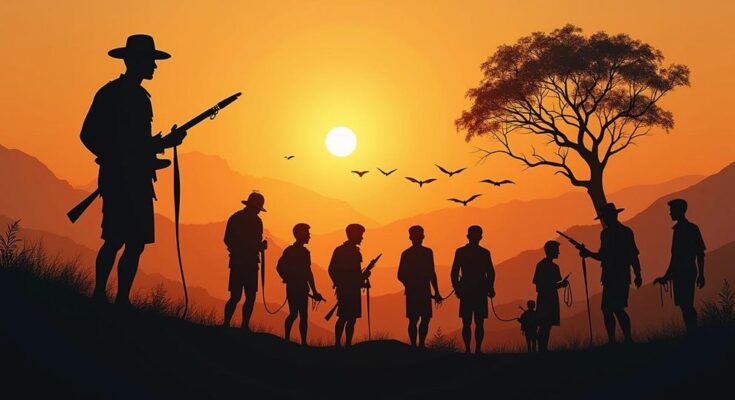The article delineates the unique geopolitical conflicts of Palestine and Kashmir as legacy issues of colonialism. It discusses the historical contexts of both disputes, the international alignments involved, and the implications of military engagements and geopolitical narratives on the global stage. The analysis highlights the contrasting foreign support each region receives, ultimately advocating for a nuanced understanding and re-evaluation of international perspectives on these crises.
The ongoing geopolitical tensions surrounding Palestine and Kashmir have often drawn parallels between the two regions, despite their unique historical contexts. At the recent United Nations meetings, Pakistan’s Prime Minister reiterated this comparison, reminding the global community that both regions symbolize the unfortunate legacies of colonialism. Israel’s establishment in 1948 coincided with the first conflict between India and Pakistan over Kashmir, marking the beginning of entangled histories influenced by colonial policies. The military standoffs between India and Pakistan, including multiple wars, have led to a stalemate and a prolonged period of inaction since the Simla Agreement in 1972. In contrast, the Palestinian struggle has remained a continuous source of conflict, piecing together a narrative of aspiration for self-determination, supported by global superpowers at different times. As the Cold War’s influence waned, Kashmir reemerged in the spotlight following the political and military shifts occurring after the Berlin Wall’s fall in 1989, yet its situation remains relatively unchanged internationally. Moreover, while resistance elements in both regions have engaged in violent protests, their geopolitical alliances diverged sharply; Pakistan has historically aligned with Western powers regarding Kashmir during the Cold War era, while Palestine often found itself supported by Russian and Middle Eastern counterparts. This divergence is highlighted by the unfolding chaos in the Middle East, where past Soviet allies, such as Iraq and Libya, have faced devastation from U.S.-led military operations. Furthermore, India’s strategic alliance with Israel reflects an intricate regional dynamic where old allegiances fortress new ones, significantly placing both nations in stark contrast to Pakistan’s international positioning. Pakistani diplomatic efforts frequently underscore a nuclear threat narrative to contextualize the Kashmir issue. Ultimately, such appeals have garnered limited traction in an international arena where dialogues increasingly shift towards more pressing geopolitical crises. India’s attempts to showcase democracy in Kashmir through orchestrated visits for foreign diplomats also signal an effort to reframe the narrative, drawing attention to its democratic processes in stark contrast to the long-standing militancy defining Kashmir’s landscape. Despite continuous military preparations from both sides, India has not exhibited the same international inclination towards discussing the Kashmir issue, preferring instead to absorb criticism and control the narrative within the region. The recent conflict escalation involving Hezbollah and Hamas showcases the weight of military intelligence, with advanced Western satellites monitoring activities around Israel. This heightened surveillance capacity starkly contrasts with the situation in Kashmir, where geopolitical visibility is markedly lower. With increasing tensions and military engagements observed in Lebanon, the region is enmeshed in precarious diplomacy threatening to destabilize long-standing peace settlements. As these narratives unfold, the positions of Iran and its support for regional allies reveal a commitment to maintain influence in the ongoing conflict. Hezbollah’s preparedness and allegiance to combating foreign intervention exemplify the complexity of the current Middle East situation, overshadowing the decades-long Kashmir dispute. The writer brings to light the enduring and evolving challenges confronted by both regions, ultimately revealing the disparities in international engagement and the multifaceted nature of conflicts rooted in colonial histories. The underlying themes centralize on the need for a re-evaluation of international support and suggest a reconsideration of the strategic approaches to both Palestine and Kashmir, reminding us of the lasting legacies of colonialism that continue to dictate the political narratives today.
The article examines the comparative geopolitical conflicts of Palestine and Kashmir, both of which have their origins in colonial legacies. The analysis includes historical perspectives on their struggles, military engagements, and geopolitical alliances, highlighting the factors that contribute to their ongoing disputes. It emphasizes the policies pursued by global powers and regional players that shape these conflicts, drawing essential distinctions between the two cases.
In summary, the complexities surrounding the conflicts in Palestine and Kashmir underscore their evolving geopolitical dynamics, shaped significantly by historical colonial influences. Despite their superficial similarities, both regions demand distinct considerations and approaches from the international community. Understanding these nuances is essential for addressing the root causes of their struggles and for fostering peace and diplomacy moving forward.
Original Source: www.dawn.com




